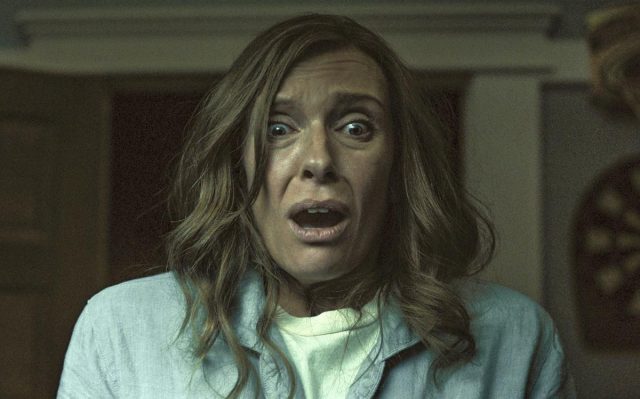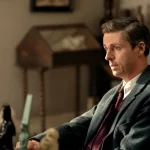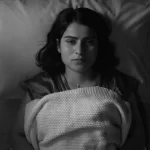Hereditary: The Very Model of Horror, by David Bax
One of the many things Ari Aster’s Hereditary gets right is its depiction of grief. Taking place in the aftermath of a senile matriarch’s death, the movie deftly captures the way that mourning lays a heavy wool blanket over everything, dampening the senses and slowing things down. To what extent the astuteness of Aster and his cast are put to good use will come down to how you approach the film. Hereditary is a truly, disturbingly terrifying movie, even if its ultimate goal appears to have more to do with what-the-fuckery than with any kind of emotional catharsis.
Annie (Toni Collette) is struggling to make sense of her own sorrow following the passing of her mother, whom she loved but wasn’t close to. Annie’s children are on opposite sides of the equation; Peter (Alex Wolff) is essentially unfazed while younger daughter Charlie (Milly Shapiro), whom Grandma openly considered her favorite, is shaken, questioning the hierarchy of the family and the extent of her own safety in the world. Meanwhile, Annie’s husband Steve (Gabriel Byrne) is trying to be the strong, calm center but often appears to be more an observer than a member of the family. Things only get worse when Annie befriends Joan (Ann Dowd), a woman she meets at a grief support group, who begins to interest Annie in the possibility of contacting departed souls.
Aster puts his trust in this cast and it pays off. Hereditary’s success as a horror movie depends on our believing the extent of the psychological—and sometimes physical—anguish of these characters. Collette, in the principle role, goes all in and Wolff, who is eventually tasked with similarly outlandish behavior, follows her lead. Shapiro, in her film debut, is reserved and spot on in her depiction of a troubled young girl whose attitude and behavior are equally sympathetic and off-putting. Byrne is a comfortable presence, even when he’s playing bewildered, a skill that has aided him in his late career prevalence of playing an older father to teenagers (including 2015’s Louder Than Bombs and the HBO series In Treatment, where his son was played by Wolff). And Dowd is the secret weapon, transitioning fluidly from pitiable to nurturing to terrifying.
Hereditary’s scares are lovingly crafted, individually tailored to their place in the movie and the character to whom they are happening. There are no cookie-cutter frights here. Instead, the specificity of these moments makes you want to sit up and look closer, even though you’re afraid of what you’ll see. It’s almost subtle, up until the point where it’s very much not. It probably helps that the family’s house is the kind of place ghosts seem to love, all hard woods and large rooms, each with enough nooks and crannies for them to wait for us in.
Annie, an artist who works in miniatures and dioramas, gives us an overview of the house and grounds through her latest project, which focuses on their home life. Almost playfully, Aster occasionally uses the models as establishing shots instead of the locations; they’re so well made, it takes a second to register the difference. That confusion reflects the increasingly unreliable nature of the reality that exists inside.
As things become increasingly unhinged, Hereditary becomes more and more frightening, submerging the viewers in horror rather than splashing them with occasional waves. In my screening, this final section was met with a smattering of nervous laughter. It’s hard to blame people for reacting this way; these aren’t exactly the kind of scenes that make one shout in fear. Rather, they are so deeply unsettling that laughing seems as reasonable a response as any. There’s a lingering frustration that the movie’s ending isn’t transformative for the audience (though it definitely is for the characters); it’s more of a “That was weird” kind of beat. Still, in terms of both quality and quantity of scares, Hereditary just may be a new horror classic.





























